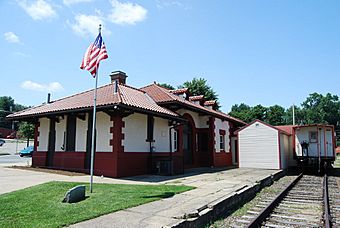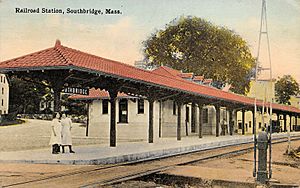Southbridge station facts for kids
Quick facts for kids |
|
|
New York, New Haven & Hartford Passenger Depot
|
|
 |
|
| Location | Larochelle Way, Southbridge, Massachusetts |
|---|---|
| Built | 1910 |
| Architectural style | Spanish Villa |
| MPS | Southbridge MRA |
| NRHP reference No. | 89000554 |
| Added to NRHP | June 22, 1989 |
The Southbridge station is an old train station in Southbridge, Massachusetts. It was built in 1910 by the New York, New Haven and Hartford Railroad. This building is special because it has a unique Spanish-style look, which is rare in the area. It is also the only old train building left in the town. In 1989, it was added to a special list of important places called the National Register of Historic Places. Today, the building is used by the town for car registrations.
About the Old Train Station
This old station is located near the downtown area of Southbridge. It sits close to the Quinebaug River, where many factories used to be. The building is a single-story structure made of wood. It has a unique Spanish Colonial style, with smooth walls and a red tile roof.
There used to be a covered waiting area for passengers next to the tracks. This area had a similar roof to the station building. However, that part of the station is no longer there.
A Look Back at Its History
Train service in Southbridge started way back in 1866. The first trains were run by the Blackstone and Southbridge Railroad. Over time, different train companies took over the service.
In 1907, the New York, New Haven and Hartford Railroad began running the trains. They built this specific station in 1910. It was used as a place for passengers to catch trains until 1930. The Spanish style of the building was common for train stations in the early 1900s, even though it's not a common style for other buildings in central Massachusetts.




